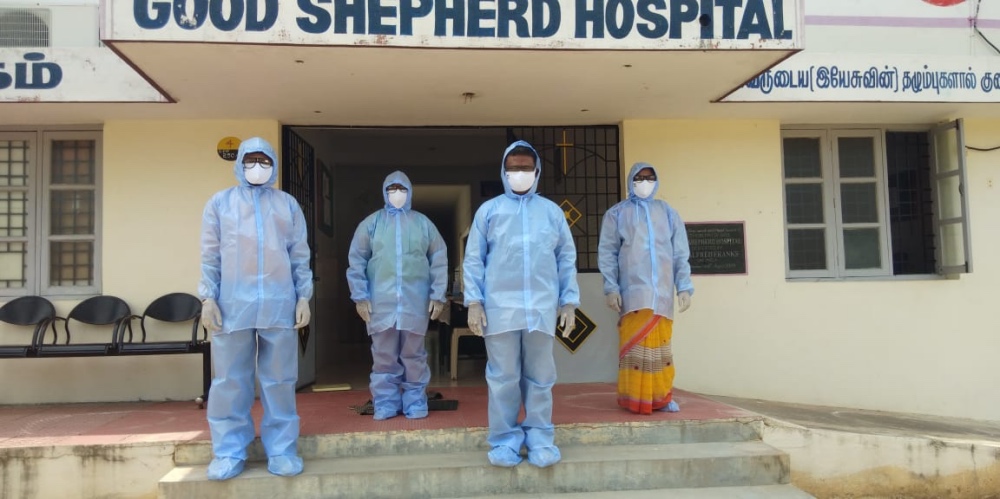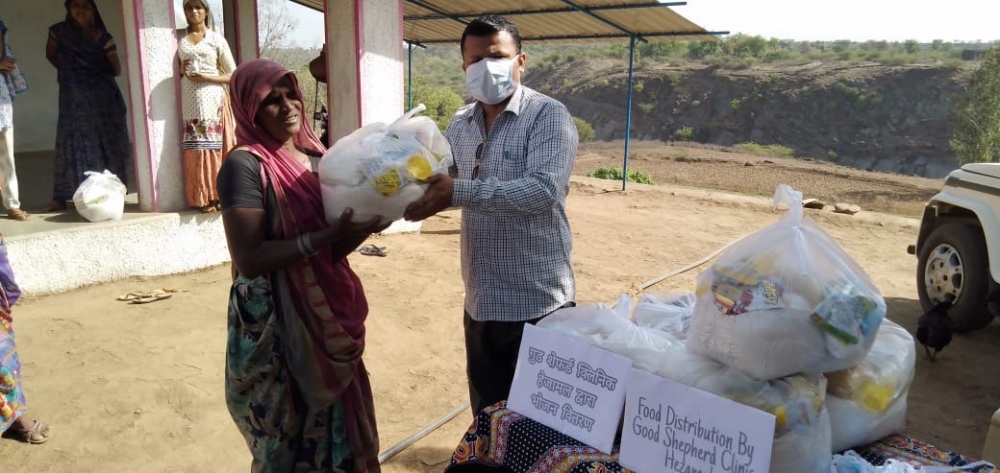
SALLY BRUCE, a member of the communications team at DFN (Dignity Freedom Network) – which advocates and cares for India’s oppressed peoples, looks at the hardships facing the vulnerable in India and how the organisation is helping…
On 22nd June, 15,138 new COVID-19 cases were added to India’s statistics, the most in a single day thus far. This was the 11th day in a row with more than 10,000 new cases registered. India now ranks fourth for reported COVID-19 cases, behind the US, Brazil and Russia and is not expected to peak for some weeks yet.
While official numbers state that 13,703 people have died of COVID-19, this does not include the thousands that have died of COVID-19 symptoms who were not tested. Testing levels remain low, and headlines broadcast that hospitals in many parts of India are at breaking point, and train carriages are being converted into makeshift isolation wards. Symptomatic people fear going to the hospitals. They are likely to be turned away, or worse, they may well die.

Medical staff at a DFN-supported medical facility. PICTURE: Supplied.
With five clinics and many more sub-centres, and over 1,000 community healthcare workers, our medical teams have been well positioned to respond. Staff initially focused on prevention, providing awareness, training, masks, and sanitisers to vulnerable communities. Clinics provide health care and health pathways, and have transitioned to incorporate tele-medicine to increase their effectiveness.
Kanjan* was aware of the dangers of COVID-19 yet despite five days of unrelenting fever and body aches he refused to go to the government hospital, knowing the risks involved. He tried consulting a local practitioner, but was turned away. Not only was he afraid of the government hospital, he feared the effects of a positive COVID diagnosis, knowing his entire family could suffer discrimination, be ostracised by the community and potentially evicted from their home.
“The hardships facing India’s informal workforce is one of the starkest examples of how social inequality threatens to undermine virus containment efforts around the world, and exemplifies the issues faced by the bottom half billion.”
A relative heard about our local clinic and how are doctors were utilising virtual medicine. He decided to see if the doctor might be able to help. Blood tests were ordered and medicine prescribed, but Kanjan’s health deteriorated and he had no choice but to go to hospital. The doctor found a suitable hospital and assurance that his team would look after the family, ensuring all were safe and had all they needed.Hospital tests confirmed Kanjan had COVID-19. He spent three days in ICU, covered by the prayers of our pray-ers around the world. Kanjan is now recovering in the isolation ward.
Kanjan is literally alive because of our team and our transition to utilise virtual medicine. He and his family are grateful and report they have never been treated with such care and compassion.
Lockdown in Indua was announced in March with just four hours’ notice, and has been catastrophic for daily wage earners who face starvation, starvation related deaths, further exploitation and increased vulnerability to COVID-19 as well as other diseases. Between 114 and 120 million people have lost their jobs overnight, of these over 90 million are daily wage earners. These people have no reserves for a rainy day. Many do not have the capacity to purchase and store excess supplies, nor do they have well-stocked refrigerators. Many have no ventilation in their homes to help with the heat of summer, nor accessible water or toilets, and have been beaten for leaving their homes for these essential needs.
The hardships facing India’s informal workforce is one of the starkest examples of how social inequality threatens to undermine virus containment efforts around the world, and exemplifies the issues faced by the bottom half billion.
With 103 schools across the country – all closed for the summer many are being used as food distribution centres, providing urgent supplies to people experience extreme and unexpected poverty.
One of our schools in northern India is in a community of Dalit, Tribal, and lower caste people. The COVID-19 crisis and associated lockdown took everyone by surprise and rendered 80 per cent of the village jobless, with quickly diminishing food supplies. The government announced a package for free food and income subsidy but this was accessed by less than 10 per cent of the community.
Our team leaders provided food rations for needy families who missed out, and worked to facilitate access to locally available government programs for as many as possible. In May, around 500 people in this community received our rations including wheat, rice, oil, pulses and spices.
Rani* is one of our pastors from northern India, who serves among the Musahars (rat eating community). By day he works as a local labourer to augment his salary so he can provide for his wife and two daughters.
Lockdown left the family without income. As food became scarce, Rani left his hut seeking work. The police found him and beat him for being out of his hut. The family despaired physically and emotionally and were barely surviving on one small meal a day between them.

Food distribution at a DFN-supported clinic. PICTURE: Supplied.
One of our team heard of their plight, visited the family and provided food a month of food rations. They are thankful to the Lord and to our team as they were literally facing starvation. Our team are now aware of their situation and will provide ongoing care and support during this season.
Last month our team reported:
• More than 7,000 people fed through food distribution networks (church, school, clinic);
• Thousands more accessing government programs and initiatives;
• 18,000 patients treated in our clinics;
• 90,000 more treated by our community health workers;
• 1,300 villages with an active healthcare presence;
• 3,000 patients treated through virtual medicine;
• 1,000s of hand washing kits and sanitisation packs distributed;
• 1,000s receiving nutritional supplements; and,
• one Jogini dedication prevented, several “missing girls” rescued and returned to safety.
The needs are huge. India has a population of 1.35 billion with many already living below the poverty line. COVID-19 and the lockdown response mean that many more are joining them. Our teams are impacting thousands of lives but there is so much more need. With infections yet to peak, we urgently need to do more.
If you would like to make a tax-deductible gift to help expand the reach of our work during this crisis, email [email protected], call in Australia 1 800 949 774 or visit www.dfn.org.au.
* Names changed for privacy reasons.
Sally Bruce is a pseudonym for a member of the DFN communications team. Her real name has been withheld for security reasons.





